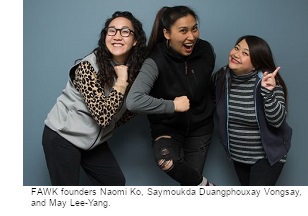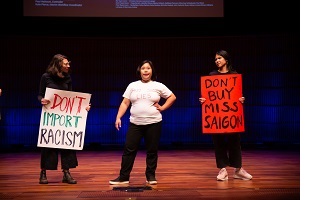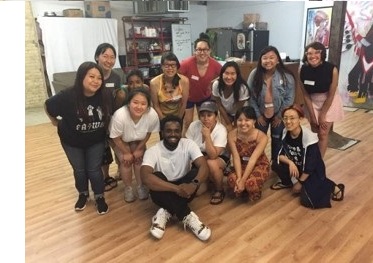

 Founded by Naomi Ko, May Lee-Yang, and Saymoukda Duangphouxay
Vongsay in 2014, Funny Asian Women Kollective’s (FAWK) goal is
to use humor and comedy to boost the visibility of and give voice to
Asian Pacific Islander Desi American (APIDA) women. May is a
Hmong-American writer, performance artist, and teacher, Saymoukda is
Lao playwright, poet, and social practice artist. and Naomi is a
Korean-American filmmaker, writer, actor, comedian, and cultural
producer. These talented multi-hyphenates came together to create a
place where Asian women could freely tell their stories.
Founded by Naomi Ko, May Lee-Yang, and Saymoukda Duangphouxay
Vongsay in 2014, Funny Asian Women Kollective’s (FAWK) goal is
to use humor and comedy to boost the visibility of and give voice to
Asian Pacific Islander Desi American (APIDA) women. May is a
Hmong-American writer, performance artist, and teacher, Saymoukda is
Lao playwright, poet, and social practice artist. and Naomi is a
Korean-American filmmaker, writer, actor, comedian, and cultural
producer. These talented multi-hyphenates came together to create a
place where Asian women could freely tell their stories.
With performances, cabarets, workshops, and videos, this Minnesota-based group opens up discussions about controversial issues by making them more accessible and engaging through the use of humor. “I think humor helps us to talk about hard stuff and make it more accessible,” says May, “And also it gives us the power to subvert a lot of systems and people in a way that still doesn't make those people feel too bad. They still want to engage with us.”
Using their own experiences for inspiration has allowed these three to create pieces that are able to capture the Asian and Asian American experience. “A lot of our inspiration just comes from our lives and our lived experiences. You know, we don't have the luxury to just only imagine new worlds. We also have the responsibility to our communities to talk about our experiences,” explains May.
 “I think a lot of our
ideas and our inspirations come from there. But also, it's just
because our lived experiences, our realities are traumatic [and]
come from a place of pain. Sometimes we want to figure out ways to
laugh. We want to have fun. And I think that also has a really big
part of it. How can we take, you know, the every day and make it
fun?” continues Naomi.
“I think a lot of our
ideas and our inspirations come from there. But also, it's just
because our lived experiences, our realities are traumatic [and]
come from a place of pain. Sometimes we want to figure out ways to
laugh. We want to have fun. And I think that also has a really big
part of it. How can we take, you know, the every day and make it
fun?” continues Naomi.
When asked about the challenges of creating and running such a group, Saymoukda replies, “There really wasn't a challenge, because we're like, let's just do it. And we did it. I think the hard part was cultivating audiences a little bit.“ “I think the difficult part is getting out of Minnesota,” adds Naomi, “ There is this kind of infighting that's going on with the [Asian] community on who gets to represent the community and who gets to be the voice who gets to share and promote these stories, but then also just that we live in this type of scarcity mindset when we feel like we have to compete within ourselves. It takes up a lot of unnecessary energy.” However, they haven’t let this stop what they are doing and how they are doing it. “We started off as a comedy group that wanted to just create a space where Asian women could tell their truth. Uncensored. And yet that has spoken to a lot of people. And whether we were intentional about it or not, our work is deeply political, because our bodies are political.” says May.
 In addition to
FAWK’s own projects, they have also worked with other organizations.
“We did a collaborative conversation with Blackout Improv, which
is, you know, the Twin Cities’ premier Black improv group. And that
it was called Black Fawk Down,’ explains Saymoukda. They also
collaborated with The Center for Cultural Power that originally
started because of the xenophobia that was growing during the
pandemic. This pivoted after George Floyd was killed by Minneapolis
police officers and resulted in a video that was a reaction to the
grief and the fight for justice. Their goal was to help the APIDA
community see how the APIDA community has been an ally to and has
also been complicit in the oppression of the Black community.
In addition to
FAWK’s own projects, they have also worked with other organizations.
“We did a collaborative conversation with Blackout Improv, which
is, you know, the Twin Cities’ premier Black improv group. And that
it was called Black Fawk Down,’ explains Saymoukda. They also
collaborated with The Center for Cultural Power that originally
started because of the xenophobia that was growing during the
pandemic. This pivoted after George Floyd was killed by Minneapolis
police officers and resulted in a video that was a reaction to the
grief and the fight for justice. Their goal was to help the APIDA
community see how the APIDA community has been an ally to and has
also been complicit in the oppression of the Black community.
As May puts it, “It’s going to expand it beyond Black and Asian; you're going to have a frank conversation with folks from all across the spectrum.”